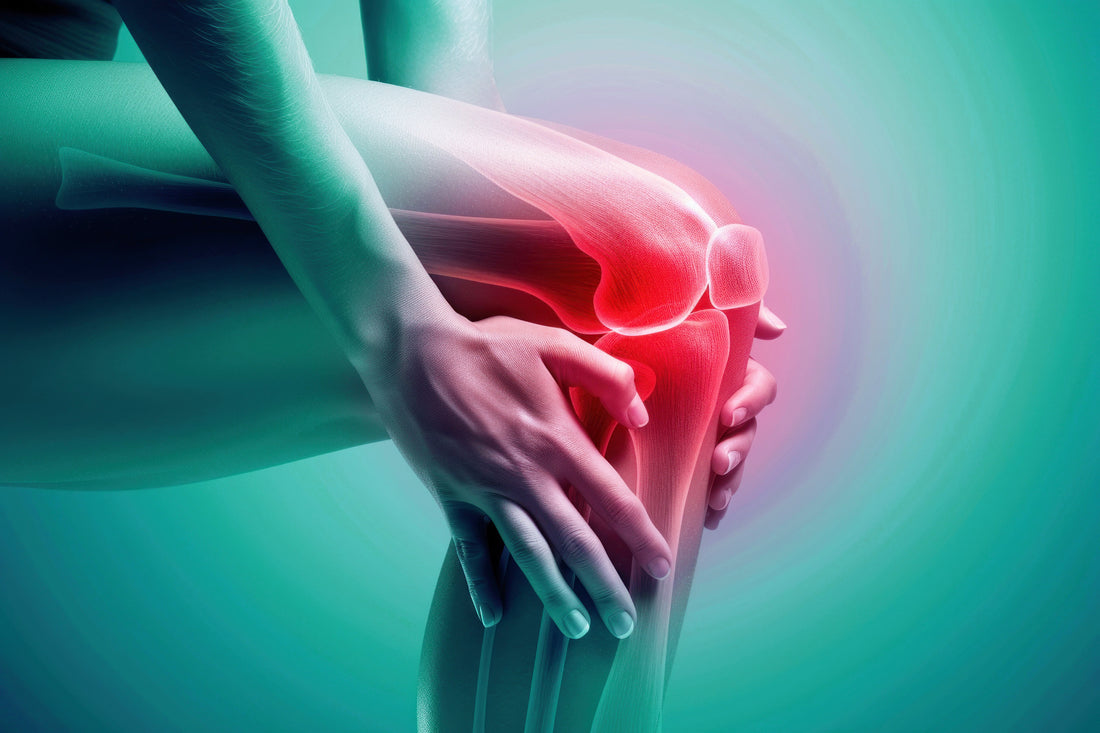
Muscle Pain: First Aid for Sore Muscles
Share
Have you been working your butt off at the gym? Or have you just moved house? There's a good chance that you'll have muscle pain for days afterward. We'll tell you everything you need to know about muscle pain.
What is muscle pain?
Did you do a lot of sports last week, lift a heavy bag or go for a long walk? Then you may be suffering from muscle pain. Muscle pain serves to protect the muscles from overload. This is usually also the cause of muscle pain. If you overload your muscles, they become damaged. During the recovery of your muscles, a mild inflammatory reaction occurs. This gives the recognizable painful, cramped or stiff feeling. Muscle pain often disappears by itself within a few days.
Are you unsure about the cause of your muscle pain? Or do your symptoms not go away within a few days? Then consult your GP.
Is muscle pain necessary for building muscle mass?
You don't have to get sore muscles to build muscle mass. Especially if you exercise regularly, you will have less sore muscles and still grow muscles. Conversely, sore muscles are not always an indication of muscle growth. For example, if you have had a football match that your body is not used to, you can also have a lot of sore muscles without having built up muscle mass. Your body also has a limited capacity to recover. If you exert yourself too much, recovery can take longer and you can even break down more than you build up. Fortunately, this will not happen so quickly for the average athlete.
How does muscle pain develop?
Whether you have muscle pain in your legs, arms, back or stomach: muscle pain can have different causes. Below we have listed the three most common ones for you:
- Overload
- Flu
- Medicines
Overload
The most common cause of muscle pain is overuse. This muscle pain often occurs after exercising. For example, have you been running longer than you normally do and are you now suffering from muscle pain in your legs? Then this is probably due to overuse of your leg muscles. You can overuse your muscles by exercising, but also by other forms of (heavy) physical exertion. Think for example of DIY, gardening or moving. Muscle pain can also be the result of a bruise or fracture. Within the scientific literature, a distinction is made between three forms of muscle pain due to overuse: acute muscle pain, muscle pain due to a bruise or tear and delayed muscle pain. The duration of the overuse of your muscles differs per form:
Acute muscle pain
Acute muscle pain is the muscle pain that you feel immediately when you are exercising. You can think of it as when your legs become acidic . It is important not to train too deeply into the acidification. This is often a sign that you are training too hard. Do you suffer from acute muscle pain when exercising? This muscle pain usually disappears after a few days.
Muscle pain due to a bruise or tear
This is the result of a bruise or a tear. Especially with this type of muscle pain, it is important to stop exercising and rest. If you suffer a lot from muscle pain and this pain persists, it is advisable to contact a physiotherapist or your family doctor.
Delayed muscle pain
The third variant is delayed onset muscle pain. The delayed onset muscle pain lasts for about a few days and can last up to a week. Delayed onset muscle pain is usually only noticed after 24 hours. The most severe pain follows after about 48 hours.
Flu
Muscle pain is a common and characteristic symptom of the flu. In that case, muscle pain is caused by a build-up of waste products in your muscles that your body cannot properly remove.
Medicines
The use of certain medications can cause muscle pain. Examples of these are medications for high cholesterol and medications for high blood pressure.
Is muscle pain good or bad?
Severe muscle pain after exercise gives you the feeling that you have had a good workout. No pain, no gain. Right? That is not entirely true. Even if you have mild muscle pain, you can have had an effective workout. Moreover: if you have so much muscle pain that you can no longer exercise the days after, then that does not benefit your sports results. It is much more important to exercise every day or every other day, instead of exhausting your body completely once a week. A lot of muscle pain is therefore not a success indicator for your sports results!
Can you exercise if you have muscle pain?
The answer to this question is yes and no. If you have muscle pain, it is important that you give your muscles the chance to recover by taking a rest. It is therefore not wise to strain the same muscle group several days in a row. For example, do you often have that after squats you can barely walk the next day because of muscle pain in your legs? Then that is a sign that you may have strained the muscles too much and perhaps even overstrained them. In general, you should be able to train at a normal level again after two to three days and be at least as strong as the previous time. It is possible that you have less strength at one time, for example due to a bad night's sleep.
What about exercising with delayed onset muscle soreness?
Exercising once with some muscle pain is not bad, but it is unwise to do this every week. If this happens too often, muscle damage increases, which can lead to overload and no training progress.
What about exercising with left muscle pain?
Exercising once with some muscle pain is not bad, but it is unwise to do this every week. If this happens too often, muscle damage increases, which can lead to overload and no training progress.
Still exercising with muscle pain?
Do you still want to exercise with muscle pain? Then choose a light (cardio) workout, such as walking, swimming, cycling or easy running. This stimulates blood circulation. Avoid intensive exercises and heavy weights. Exercising with muscle pain is certainly possible, but don't make it too intensive!
Muscle pain from a bruise or fracture? So don't exercise!
In case of a bruise or a muscle tear it is important to stop exercising immediately and if the pain persists contact a physiotherapist or your family doctor. So do not exercise with muscle pain if you suspect that this is caused by a bruise or fracture to prevent further damage!

